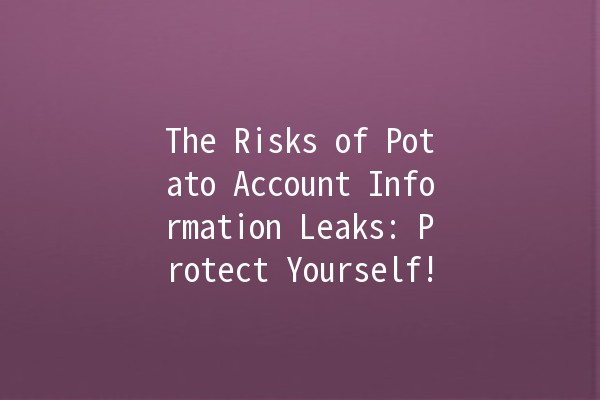In today's digital age, online security is paramount. With the increasing use of various applications, accounts, and platforms, the risk of account information leaks has become a pressing concern. One such platform that has recently garnered attention for its potential vulnerabilities is Potato. While users enjoy the myriad features offered by Potato, it is crucial to understand the risks associated with potential data breaches. This article delves deep into the specifics of Potato account information leak risks, how they can impact users, and practical tips to safeguard personal information online.
Understanding Potato: What Is It?
Potato is a versatile platform that offers a range of services, including social networking, messaging, and file sharing. With millions of users worldwide, it has established itself as a goto app for many. However, with great popularity comes great responsibility—particularly regarding data security.
The Nature of Data Leaks
Data leaks can occur through various channels, including cyberattacks, inadequate security measures, and even user negligence. For Potato users, understanding how these leaks can happen is the first step in safeguarding their accounts.

Common Causes of Potato Account Information Leaks
Risks Associated with Potential Information Leaks
When account information leaks occur, the consequences can be severe. Here are some critical risks that users of Potato may face:
Identity Theft
One of the most alarming consequences of data leaks is identity theft. Once attackers gain access to personal information, they can impersonate the user, leading to fraudulent activities that can damage the user's reputation and finances.
ancial Fraud
Attackers can access linked bank accounts or payment information, leading to unauthorized transactions. Without immediate action, users can lose significant amounts of money.
Loss of Reputation
In professional circles, a data breach can severely damage an individual's reputation. Compromised accounts can lead to sensitive information being exposed, affecting careers and professional relationships.
Emotional Distress
The psychological impact of becoming a victim of a data breach cannot be understated. Victims often experience stress, anxiety, and a loss of trust in digital platforms.
Five Essential Tips to Protect Your Potato Account
To mitigate the risks associated with Potato account information leaks, users can adopt various strategies. Here are five essential productivityboosting tips:
Explanation:
Creating complex passwords is critical. A strong password should include a mix of uppercase and lowercase letters, numbers, and special characters.
Example Application:
Instead of using "password123," consider using a phrase like "MyP@ssw0rdIsSup3rS3cur3!". Utilize password managers to generate and store unique passwords for different accounts securely.
Explanation:
Twofactor authentication adds an extra layer of security, requiring not only a password but also a secondary verification method.
Example Application:
When prompted, set up 2FA via a mobile device app or SMS code. This means that even if an attacker has your password, they would still need access to your second verification method.
Explanation:
Staying vigilant is essential to avoid falling for phishing scams that trick users into providing personal information.
Example Application:
Always verify URLs and email addresses before clicking on a link. If an unexpected email requests personal information, contact Potato support directly for verification before responding.
Explanation:
Keeping your apps and operating systems up to date is crucial as updates often include security patches.
Example Application:
Set your device to automatically update software whenever new versions are available. Regularly check the Potato app for updates to ensure you have the latest security features.
Explanation:
A VPN encrypts internet traffic, masking your IP address and enhancing security when using public WiFi networks.
Example Application:
Choose a reputable VPN service and always activate it before using public WiFi. This extra step can help prevent interception of sensitive data.
Frequently Asked Questions About Potato Account Information Leaks
Indicators of a compromised account include receiving unexpected emails regarding unauthorized changes, being locked out of your account, or noticing unfamiliar activity on your account. If you suspect unauthorized access, immediately change your password and enable 2FA.
Yes, you can recover a hacked account. Contact Potato support through their official channel, provide necessary verification to prove your identity, and follow their recovery instructions.
Do not click any links or download attachments from suspicious emails. Report the email to Potato’s support team and delete it. Always verify any communications directly through the Potato app or official website.
Potato prioritizes user privacy, and personal information is generally not publicly shared. However, be cautious about what you post and share publicly on the platform, as some information may be visible to others depending on your account settings.
Follow the best practices outlined above: use strong passwords, enable 2FA, be wary of phishing attempts, keep your software updated, and use a VPN when accessing your account on public networks.
If you suspect that your password has been compromised, immediately change it to a new, strong password. Check for any unauthorized logins or changes to your account and, if necessary, reach out to Potato support for further assistance.
By understanding the risks associated with Potato and implementing these protective strategies, users can significantly reduce the likelihood of falling victim to account information leaks. Engaging actively in your online security not only protects your data but also enhances your overall digital experience.